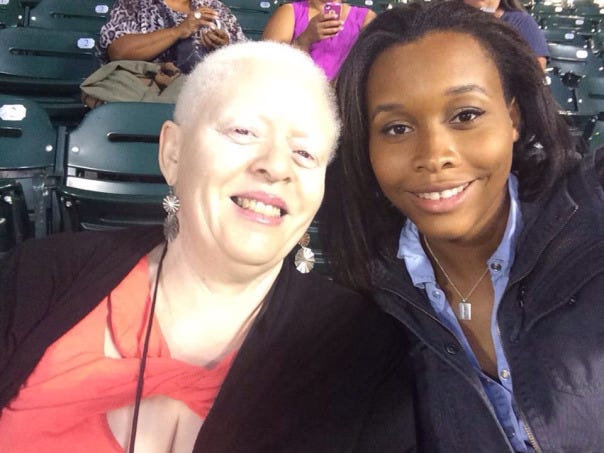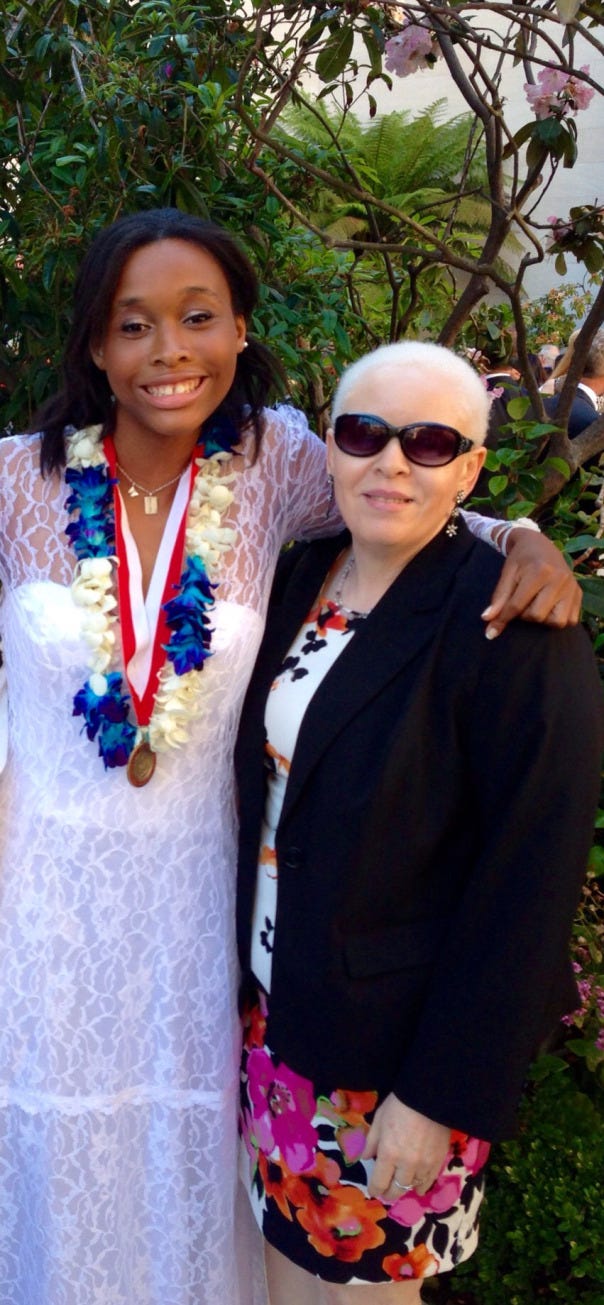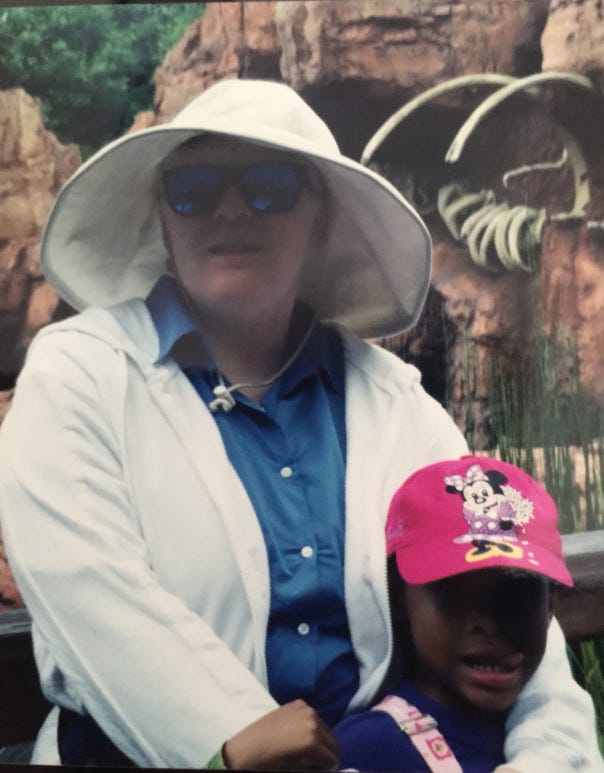 I have been keping a little secret. I didn’t want to jinx the success of is to come. But, now I can share that tomorrow I along with my daughter Jewel will be interviewed by Anjuli Sastry, a reporter with NPR for a story about living with albinism as a person of color. I am nerdy enoughand of a certain age to be completely excited about this endeavor.
I have been keping a little secret. I didn’t want to jinx the success of is to come. But, now I can share that tomorrow I along with my daughter Jewel will be interviewed by Anjuli Sastry, a reporter with NPR for a story about living with albinism as a person of color. I am nerdy enoughand of a certain age to be completely excited about this endeavor.
Last summer Jewel and I collaborated on a blog post about parenting with albinism. I include it below for your reading pleasure.
More to come after the interview.
Parenting With Albinism
Today’s blog could not have been accomplished without the help of my daughter Jewel Devora.
For as long as I can recall I knew I would be a mom. During my twenties I felt strongly that I wanted to have a child with albinism. I wished for a child who looked like me. I know this is the desire for many, though not all, women with albinism.

There is a need to see ourselves reflected in another being. Well, in my case the path to becoming a parent was far from straight forward. After several failed attempts at conceiving, I discovered I had fertility issues. Still, I/we tried. I asked myself what was more important, birthing a baby or parenting a child? In late June of 1995 my daughter was born. Less than 24 hours later I held her for the first time. My life was forever changed.
Through my daughter I have learned a multitude of life lessons. Parenting with albinism has been one of the best and most challenging adventures of my life. Of course my girl walked at nine months old. Of course she climbed shortly thereafter. Of course my vision was taxed to the max whenever we went to any of her favorite playgrounds. I established rules like, “if you can’t see me, you are lost.” And “if I call you, you must come to mommy straight away.” In all honesty, this was the easiest aspect of parenting because young children are mostly cooperative.
Once my daughter began elementary school, I was faced with new challenges. There were new faces and voices to memorize, relationships with other parents to form. The school sent home weekly newsletters and annually send forms that required updating. After struggling with the small print for two years I approached the administration to see if the information could be sent electronically. I needed to educate others so that I could gain assistance for my visual needs. For me it was a vulnerable moment. For the school, my request created a new protocol of disseminating information.
Throughout my daughter’s education there were various sports events to attend. Most often I was able to see her because she was either one of two or in some cases the only child of color on the team. This is simply how it was. I found ways to identify my daughter so that I could cheer her on. It also helped that she was quite tall. Once at an obscenely early soccer game i came prepared with a set of binoculars.
A parent remarked on me using them. I simply stated that I was visually impaired due to albinism. From that point forward, the word got out and some parents would approach me in social gatherings or let me know where exactly my daughter was on a field or within a group.
These are small things, yet monumental ones for me that which I had to often overcome. Primarily the battle was internal. How much about my vision or about albinism did I want or need to share? How uncomfortable was I willing to be?
Was I willing to not see my daughter score a winning goal because I didn’t want to use adaptive equipment? Would I pass on taking her to a pool party because I didn’t wish to be in the sun?
The most difficult aspect of parenting with albinism was the impact my albinism had on my daughter. her friends would ask her if I was her why I was so white when she was brown?
She would end up educating her peers about albinism, which I didn’t learn until she graduated from high school. I asked Jewel if she would consider sharing an experience about the affect of having a mom with a disability had on her life. here what she shares

I remember being in the “anything my mom does is the worst thing in the world. She’s trying to take over my life and control me and I can’t be tamed” mode. I was 16 and she had taken me out of school to travel with her to Europe. It was a trip to remember, really fun, lots of spirits, and lots of laughs. The time we spent anytime we travelled were some of my favorite.
I remember on our journey home, my mom was being especially annoying.
And I was over it, if only I could remember what exactly she was doing or saying so I could look back and see how ridiculous i was being. All I know is I was done and my little 16 year old brain told me to walk off and leave her to her own devices.
I walked maybe 30 feet away from my mommy and I turned to realize she couldn’t see me. And all I saw was fear, imagine a huge hub airport with thousand upon thousands of people hurrying by, late for flights and trying to make connections. And there was my mommy with our luggage looking around, panicked that she could not see me. If my mom was anyone else, if she didn’t have albinism, she would’ve seen me and probably ran over grabbed my hand and scolded me. But she didn’t, she couldn’t.
I felt a sense of sadness and selfishness that I had walked away from my mom and left her like that. It was one of the first times I had ever seen my put together mommy be vulnerable and let me tell you, it freaked me out. I knew in that moment, this was what being the daughter of someone with a disability meant, I knew this was what everyone was talking about when they asked me what it was like to have a mom with albinism.
In that moment I chose to suck it up and walk back to her. Even though I didn’t let on that I felt badly, I did. I grabbed her hand and with a giant sigh said “come on mommy! Let’s go!” And we walked to the gate, boarded our flight and went back to our usual routine in San Francisco.

I love my mom a lot, and care deeply for her. And because of her albinism I’ve had the ability to be an educator an advocate and more accepting than my peers. Though we’ve had our challenges and differences at the end of the day she’s taught me how to be a good human before I was the age of 12 and for that I am forever grateful.
Jewel and I have a wonderful relationship. I have come to learn that parenting does not cease when children head off to college, it just looks different. I am her mentor, her friend and her mom. Our conversations are varied and full of depth. I learn continually how to take risks, how to ask for what I need so that I am able to experience life fully.

*****************************************************************
I remember being in the “anything my mom does is the worst thing in the world. She’s trying to take over my life and control me and I can’t be tamed” mode. I was 16 and she had taken me out of school to travel with her to Europe. It was a trip to remember, really fun, lots of spirits, and lots of laughs. The time we spent anytime we travelled were some of my favorite.
I remember on our journey home, my mom was being especially annoying. And I was over it, if only I could remember what exactly she was doing or saying so I could look back and see how ridiculous i was being. All I know is I was done and my little 16 year old brain told me to walk off and leave her to her own devices.
I remember on our journey home, my mom was being especially annoying. And I was over it, if only I could remember what exactly she was doing or saying so I could look back and see how ridiculous i was being. All I know is I was done and my little 16 year old brain told me to walk off and leave her to her own devices.
I walked maybe 30 feet away from my mommy and I turned to realize she couldn’t see me. And all I saw was fear, imagine a huge hub airport with thousand upon thousands of people hurrying by, late for flights and trying to make connections. And there was my mommy with our luggage looking around, panicked that she could not see me. If my mom was anyone else, if she didn’t have albinism, she would’ve seen me and probably ran over grabbed my hand and scolded me. But she didn’t, she couldn’t.
I felt a sense of sadness and selfishness that I had walked away from my mom and left her like that. It was one of the first times I had ever seen my put together mommy be vulnerable and let me tell you, it freaked me out. I knew in that moment, this was what being the daughter of someone with a disability meant, I knew this was what everyone was talking about when they asked me what it was like to have a mom with albinism.
In that moment I chose to suck it up and walk back to her. Even though I didn’t let on that I felt badly, I did. I grabbed her hand and with a giant sigh said “come on mommy! Let’s go!” And we walked to the gate, boarded our flight and went back to our usual routine in San Francisco.
In that moment I chose to suck it up and walk back to her. Even though I didn’t let on that I felt badly, I did. I grabbed her hand and with a giant sigh said “come on mommy! Let’s go!” And we walked to the gate, boarded our flight and went back to our usual routine in San Francisco.
I love my mom a lot, and care deeply for her. And because of her albinism I’ve had the ability to be an educator an advocate and more accepting than my peers. Though we’ve had our challenges and differences at the end of the day she’s taught me how to be a good human before I was the age of 12 and for that I am forever grateful.
0 comments:
Post a Comment